- Home
- Jess Walter
The Financial Lives of the Poets Page 2
The Financial Lives of the Poets Read online
Page 2
Yes! I am so! Starving!
But maybe we’re all starving
hungry for the warm lights
and tight aisles of nacho-corn-
sour-cream-onion-and-chive-
barbecue-goodness—and again
I drive my boys, Skeet and Jamie
—And I’m hypnotized by the set of cat-eyed taillights I’m ordered to follow as we arrive—because where else can you find the hungry, a community of the hungry—you tail the dude in the tricked-out Festiva—damn he drive well—and that smell? Dude! says Jamie, and Skeet laughs proudly and Jamie says, Lay off the milk, Skeet! and I crack with laughter as Jamie explains, Dude’s lactose-infuckin’tolerant yo—to the flat green and orange stripes—the sheer hot white light goodness of…
…another 7/11. And here I am, just like my mother feared, stoned off my nut, unemployed, a week from losing my house and maybe my wife and kids, and I file in with my new friends, as per—(1) banger in sweats (2) dude in baggie jeans (3) kid in hoodie (4) another banger in sweats (and my slippers) and finally (5) middle-aged unemployed man in Chinos, pea coat, golf shirt and wet socks—and yes, Mom, in a perfect world, we could find an open grocery, but there are simply going to be times when you must go out in the world, into the dark uneasy dangerous places and so I go….
Straight to the freezer case and a siren of a meat-and-bean burrito which I tear into, unwrap and microwave—bouncing in squishy socks, watching that thing turn under the light like baby Jesus in an incubator—and that’s when Skeet freaks, he completely freaks! loses it! “Turn it off, man! That shit’s poison, man! They’re nukin’ us with that shit, turning us into radiated zombies!” Jamie trying to calm the poor kid through gritted teeth, “Chill, man,” but Skeet won’t chill, he just screams and points at the humming microwave oven as the clerk, this store’s Rahjiv yells: “Get that trippin’ guy outta here before I call the cops!” And everyone’s yelling, “Chill, man, chill!” and “What else he on?” and “He always be trippin, yo!” and “Don’t call the cops, dude’s on probation!”
And that’s when I remember: I am an adult and I can do…something…I can fix this, protect my boys, make the world okay, and so I grab Skeet by his round shoulders and feel his racing heart, catch his sketchy eyes and say—
“Skeet. Look at me. It’s not nuclear radiation. It’s just waves. Like sound waves,” my voice getting softer, slower: “Tiny…waves.” A deep breath. “Like good vibrations, right? That’s why they call them micro…waves. See?” And he’s still breathing heavily when I nod and the microwave beeps, and Skeet looks over, still panting. And it’s quiet in the store.
After a second, Skeet nods back. Smiles. It’s gonna be. Okay.
And I pat Skeet’s shoulder, grab my steaming burrito and get in line to pay—take my place with the starving and the sorry, the paranoid, yawning with fear, the hungry lonely lost children let down by their unemployed fathers, men zapped by history’s microwave, a generation of hapless, luckless, feckless fathers with no idea how to fix anything, no clue what to do except go home to face the incubated babies staring at their dry bowls of Crispix and confess—
—Sorry. But Skeet drank all the milk…right before he freaked—
Oh, I am such a shit father, shit husband, shit son, shit human being…and I’ve lost my shit job, am losing my shit house, am at the bottom of my shit-self when I glance over at the endless wet roll of the Slurpee machine and it’s instantly hypnotic—
Banana-blackraspberry-cherryCoke-piñacolada! So peaceful. Around and around it swirls and I could watch the wet blend of flavors forever—when Jamie sidles up and whispers, “I’m gonna mix ’em all, man,” like a soldier volunteering for a suicide mission.
“Go with God,” I whisper, and Jamie does, straight to a piñacolada icy blur, and then down the line, cherry Coke, black raspberry, and he smiles back, and I’m insanely proud as I step forward to pay for my burrito, eyes falling on the clerk’s wristwatch when…
for just a second…I can’t tell…if I’ve forgotten…what the numbers mean, or maybe…I’m just imagining…what it would be like…to forget what they mean…
I spend days staring at this guy’s watch before the second hand finally moves—and the position of the hands against the little numbers correlates to a memory of how this particular mechanism works (a memory from kindergarten: Miss Bean in go-go boots standing above me moving the hands of a sun-faced clock)—and I connect the relation of these symbols to a system of tracking the movement of the earth around the sun as across a forest of synapses there sparks a pattern of theoretical constructs (time, space, go-go boots) flaring into an evolutionary fire that represents a near miracle of abstract comprehension, an Einsteinian leap of cognition: It is four-thirty in the morning. That means I can still make it home to watch my boys’ last hour of sleep.
And in my mind, the Nissan Maxima of my responsibilities follows the Ford Festiva of my unraveling into this convenience store of realization:
Hey!
This is where they sell more milk!
But that shit’s like nine dollars a gallon.
Outside the store, Skeet and Jamie go off with the dude in the Festiva and I wave goodbye with my new white jug and I am in love with the predawn cool black, in love with my boys, in love with two percent.
The drive home is glorious—streetlight rollers like tide at dawn.
I blow laughter through my nose. Key in quietly. Like I’m sixteen again. My old senile father is asleep on the hide-a-bed in the living room, TV still on ESPN. This is what we were watching together when I left to get milk…almost four hours ago. Dad doesn’t stir. I try to take the remote control from him but he’s holding it against his cheek like a security blanket, so I turn off the set manually, old school. Every day now they show the top ten sports plays of the day—and I think: what if life was like this, and at bedtime we got to see our own daily highlights (No. 4: Skeet freaks over the microwave).
Lug my jug to the kitchen, milk in the door of the fridge—the food inside is also glorious: cheese stick, martini olives—chomp, chomp—I eat shark-like, without conscience, hover upstairs to find Lisa in bed, tousled short hair clinging to the pillow. My wife, she is cute—everyone says so, but lately that word has carried a kind of accusing overtone, as if there might be something unsettling about a grown woman who retains her cuteness well into her forties; and maybe that’s our problem, maybe Lisa is too cute, curled up in her cute little ball, cute back to the profoundly un-cute space where I’m not sleeping. Her cute cell phone on her nightstand, where she no doubt set it after TM-ing her old flame…and I toy with waking her, begging for a little marital goodness—smack, smack—maybe we can fix this thing the way we fixed problems when we were twenty-seven, but we’re in a smack-smack dry spell, and according to an online chat of hers that I reconned earlier, she’s not a big Matt fan these days. Anyway, this might not be the best time to win my cute wife back, given my B.C. bud-and-burrito breath, and the fact that I haven’t told her that we could lose the house as early as next week. (I imagine breaking it to her as we fire a couple off—Yes, yes, yes! Uh-uh! That-feels-so-good-we’re-about-to-be-evicted!)
So I step back into the hall; the boys’ rooms are across from one another, and I stand between them, fists on my hips. Sentry. Superhero. All I want is to keep them safe, healthy, fed. But with no job? No prospects? No money? No house? What did the man say—There is always hope, but not for us. Mouth dry. Head weighs eighty pounds.
I look around at my house—for a while anyway—before it begins its journey back to Providential Equity, or whatever company buys the company that bought the company that bought the bundle of red bills in which ours is bundled. Or is that more melodrama, mere self-pity? (They don’t just take your house. They want you to pay. You’re just the sort of homeowner they want. They’ll do whatever they can to keep you here.) No, all I have to do is liquidate, get some money together, show good faith, get someone from the mortgage lender on the
phone and convince them we need a little more time…that’s all…a month…what’s one month…a single month for a journalist in his mid-forties…to find a job…during a recession…with newspapers failing faster than investment banks.
I slump against the wall, played out. Who am I kidding? I can’t save anyone. Maybe Skeet’s right. Maybe they are irradiating us; maybe we’re dead already. Mom knew it, that there would always be another 7/11. And suddenly I understand her fear of terrorism wasn’t fear for herself. She wasn’t flying on any more airplanes. She was afraid for me, afraid for her kids and her grandkids, for all the hungry, lost boys. Afraid for the world she knew she was leaving. As she lay there dying, she must have realized there was nothing she could do anymore to protect the people she loved. Just as there’s nothing I can do for my boys anymore, my boys who will one day freak out alone in the tight warm aisles of a world beyond their understanding. I may as well be dead for all the help I can be to them. (My boys stir, agreeing that it’s their scary world now, their hard, hard world: go on, old man; rest now; sleep.) And in my fraying head there plays a news medley of war and instability, financial collapse and bad schools; forbearance, foreclosure, eviction; cynicism, climate crisis, 7/11—and the melody switches to my personal theme song (Concerto of Failure and Regret in E minor) as the life bleeds out from my feet and puddles in the hallway….
And this is when the unlikeliest peace comes, and I smile. Because as fucked as the world is, as grim as the future surely seems to be, as grim as it revealed itself to be for my mother as she lay dying of the tumor that kills us all, there is a truth I cannot deny, a thing no creditor can take; even as my doomed boys stir in the cold unknowing of predawn sleep, even as the very life leaches out of me, soaks into the berber, into the cracks of my arid grave, I must grudgingly admit—
—that was one great goddamn burrito.
CHAPTER 2
Giving to Charity
“HEY, THE GUY’S COMING to blow the sprinklers,”
Lisa says as she blows through the kitchen,
in a billowing skirt, and I can barely keep
my head up—something I forgot to do?
Ah, I remember now: sleep. I forgot to sleep, after I got home high from 7/11, spending instead the hour before dawn worrying and flipping between CNN and Cartoon Network—endless politics and the Go Go Gophers, international financial crises and Klondike Kat.
And apparently I’m still stoned—and a huge proponent of today’s weed—big fan. In fact, I wish I could invest in the dude who Frankensteined it up there in B.C. There used to be a cranky old government reporter at my paper named Abe Cowley, who always ranted that “kids now are fucked,” because they’d never be able to afford real estate or find jobs—I couldn’t always follow his rant—but if it ever comes up again I’ll say, Yeah, Abe, you’re right, kids today have no future, but Christ, have you tried their pot? At the table Teddy reaches past me for the milk. I think of the hours and brain cells that went into getting that simple white jug and I feel strangely proud. Lisa blows through the kitchen again—we pass like storm fronts now—this time she has her jacket on and she tells me, “Before you take the kids to school, don’t forget to turn off the water and roll up the hoses.” When I don’t say anything, she asks, “Matt?”
Beneath the table, I click my heels together. “Jawohl, herr commandant.”
Note: for future marriage-enriching banter, avoid Nazi humor.
Smart, round Teddy slides the milk over to wispy little brother Franklin, who teeters it before finally pouring milk on the counter. He diverts the wayward stream toward the bowl, but it hits his upturned spoon and splashes even more on the counter. Today’s milk spill looks like the state of Florida. I grab a dishtowel and sop.
“Hell, I can blow out the sprinklers,” my daft father says. He’s having one of his sharper moments—eyes clear as he stares out the window, gray hair bursting cactus-like off his head. He watches the horizon for something. Grips his spoon over his coffee like a battle knife. Two white pills sit in front of him, right where I left them, Aricept, the medication he takes for his cobwebby memory.
“No you can’t, Dad.” I push Dad’s pills closer, wipe milk off Franklin’s elbow.
Dad pats the pocket where he used to keep his cigarettes. Then he tosses the pills in one side of his mouth and spews anger from the other: “Would you goddamn let me do one thing around here, Matthew!”
“I don’t think you put the swear word in the right place, Grandpa,” Teddy says. When Dad first came here, my boys would look shocked whenever Dad went Old-Faithful-profane, and I began to wonder if Lisa and I shouldn’t swear more so Franklin and Teddy weren’t so put off by curse words. But they’ve gotten used to Grandpa’s eruptions; they don’t even look up from their cereal unless it’s to correct his grammar.
I try to be patient: “Remember Dad? You can’t blow out the sprinklers because you don’t have an air compressor anymore?”
“Where the hell’s my compressor.” His ears are bright red and he won’t meet my eyes. I think he sometimes knows that he’s forgetting, even if he’s not sure what he can’t remember.
“Look, we’ll talk about this later.”
Sometimes this answer is enough; other times Dad’s creeping dementia makes him angry and frustrated, like now, and he argues with me. “No. Tell me now. Where the hell’s my air compressor. Did you sell it?”
“No, Dad. You gave it to Charity. Remember?”
This is what I say when Dad persists. It is partly true. My father did give everything he owned to a stripper stage-named Charity—a young silicone-peaked girl he met when he went with some old Army buddies to a reunion in Reno that ended at six in the morning with lap dances at a strip club. Dad’s and Charity’s relationship was one of those classic May-December romances, a by-the-numbers affair, those numbers being (1) grind, (2) drunken proposal, (3) taking stripper home, (4) identity theft and (5) disappearance of stripper. After Dad drove her all the way back to his remote house in Oregon, she lived with him for exactly ten days, just enough time to clean out his bank accounts and ruin his credit, and to have her boyfriend drive up from Reno to load most of Dad’s belongings—including his beloved air compressor—into a U-Haul and drive away, Charity waving bye-bye from the truck window.
Dad was so embarrassed he didn’t tell me or my sisters for months, during which time Charity and her boyfriend lived high on Dad’s cratering credit; his power was shut off, his gas cut, phone disconnected, and I arrived at his little fifteen-acre ranch to find him eating canned corn he cooked in his fireplace. It was too late to untangle him, especially since Dad couldn’t remember the details of his undoing (although I notice he hasn’t forgotten my childhood failings, i.e., the great Little League dropped pop-up of 1977). Now, when I explain—over and over—how a stripper ripped him off, Dad’s biggest disappointment isn’t that he gave everything away, but that he didn’t get Charity’s last name so we might track her down. When I point out that Charity is a phony first name, and that getting a phony last name probably wouldn’t help us find her, Dad says I give up too easily.
“And you’re going to see Richard today?” Lisa asks on her next lap through the kitchen. Richard is our financial planner, which is a bit like being Lido Deck Officer on the Lusitania.
“Yeah,” I say. “Just to move some stuff around. Get some advice.”
Lisa doesn’t do financial crises very well—when she was twelve, her father died and she and her mom struggled—so I’ve been sparing her some of the specific details. Obviously, she knows I’m out of work and that we’re in debt (she helped get us there) but she doesn’t know, for example, that today Richard is cashing out what’s left of my retirement so I can make a deferred balloon payment to the mortgage company next week. “After the meeting with Richard,” I tell her, “I’ll go see that employment counselor. Then I’ve scheduled a bank robbery. Then I’m selling my organs to buy food. It’s a glorious day in Matt-topia.”
L
isa has learned to ignore self-pity disguised as humor—my métier. “Don’t forget to pick the kids up and take Franklin to speech therapy and Teddy to Scouts. And can you get over to Costco to pick up our pictures? I have a session after work.” Lisa goes to a therapist every other week for the compulsive shopping binge she went on last winter, or more precisely, for the depressive episode that sparked her shopping binge, the same depressive streak that is now causing her to act in other mysterious, online ways—a social surfing habit that she doesn’t know I know is getting more social all the time. She puts a hand on my shoulder, and for just a moment my wife is in my port and I put my hand on the lovely notch of her waist and look into those green eyes, but she sniffs the air around me, pushes away from the dock and makes a face. “God, what did you eat, Matt?”
“I had a burrito when I went to get milk last night.” In the language of a fraying marriage, the truth often comes with ellipses. I had a burrito…after I got stoned with some criminals…when I went to get milk last night.
“Meat or fecal?”
“What’s fecal?” asks Franklin as he washes his bowl in the sink.
“It means poop,” says Teddy, who is ten and, left alone, would insert the word poop into every sentence he uttered.
Franklin is a tender, breakable eight. He giggles, as he always does when Teddy says the word poop. Frankie is the world’s greatest audience for poop humor. “Dad ate a poop burrito?”
“I had to try the recipe before I make it for dinner tonight,” I say. Franklin gives me the requisite Eeww, and I beknight him with my coffee spoon. “Now go get dressed for school, my young apprentice.”
“I had a cigar made of donkey shit in Mexico once,” my father says to Franklin as he squeezes past the counter. “It wasn’t bad. Hard to keep lit. I bought it at a little whorehou—”

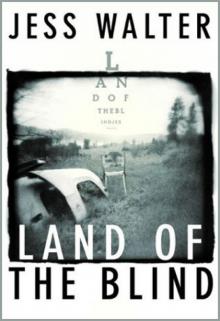 Land of the Blind
Land of the Blind Don't Eat Cat
Don't Eat Cat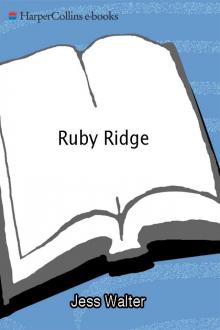 Ruby Ridge: The Truth and Tragedy of the Randy Weaver Family
Ruby Ridge: The Truth and Tragedy of the Randy Weaver Family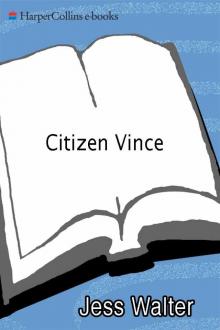 Citizen Vince
Citizen Vince Beautiful Ruins
Beautiful Ruins We Live in Water
We Live in Water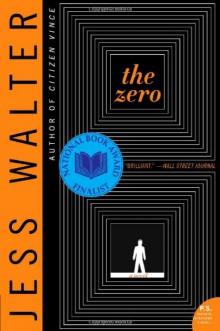 The Zero: A Novel
The Zero: A Novel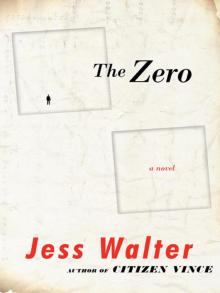 The Zero
The Zero The Cold Millions
The Cold Millions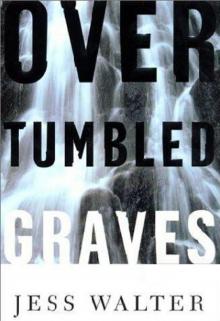 Over Tumbled Graves
Over Tumbled Graves We Live in Water: Stories
We Live in Water: Stories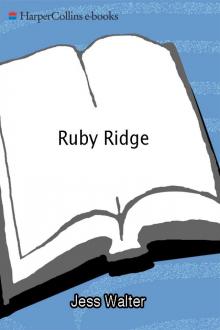 Ruby Ridge
Ruby Ridge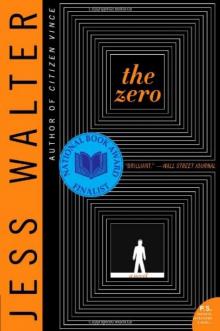 (2006) The Zero
(2006) The Zero (2004) Citizen Vince
(2004) Citizen Vince